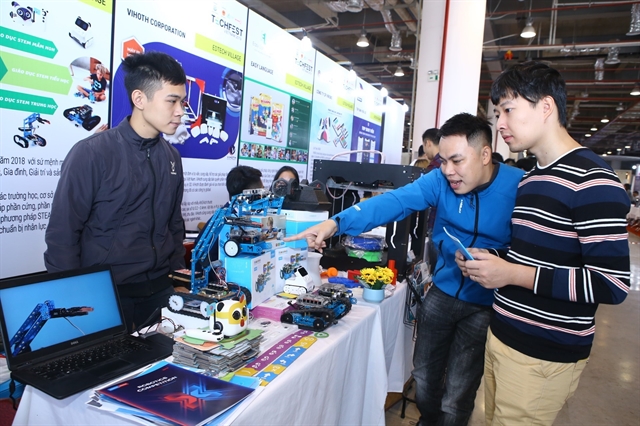Deputy Prime Minister Vu Duc Dam has urged Vietnamese start-ups to come up with initiatives, make new technology-based products and not be afraid of risks.

Deputy Prime Minister Vu Duc Dam has urged Vietnamese start-ups to come up with initiatives, make new technology-based products and not be afraid of risks.
He was speaking at the official launch of the national innovative start-up day, Techfest 2019, in the coastal city of Ha Long, northern Quang Ninh Province on Wednesday.
Themed 'Viet Nam: Globalise', Techfest 2019 aims to attract resources, manpower, technology and finance to support Vietnamese start-ups and become a platform to connect Vietnamese the start-up eco-system with that of the world at large.
“The success of Vietnamese start-ups not only makes contributions to national economic development but also blows up spirit among authorities at all levels and the whole society. If everyone gets ready to come up with new ideas and work together to turn ideas into practice, success will definitely come to us,” the Deputy Prime Minister said.
He highlighted the need to connect in the era of the fourth industrial revolution to cut gaps between Viet Nam and the world.
According to Chu Ngoc Anh, Minister of Science and Technology, the Vietnamese start-up eco-system has been supported by a legal framework including various laws.
In the first 10 months of this year, there were 29 business transactions attracting a total of more than US$750 million, with the biggest deal worth up to $300 million in fintech, the biggest such transaction in Southeast Asia
Start-up spirit has been spread nationwide. The Vietnamese start-up eco-system has grown up with 38 incubators and more than 170 co-working spaces nationwide, while 52 out of 63 provinces and cities have plans and mobilised resources to support start-ups. There are 61 innovative start-up funds nationwide, he said.
Techfest 2019 will continue until Friday with activities such as a start-up exhibition, technology showcase, matching between investors and start-ups and start-up contests.
Unlock potentials
Venture capital investment in Vietnamese start-ups surged by eight times between 2015 and 2018, said Thach Le Anh, Viet Nam Silicon Valley Accelerator’s Founder at the Eco-system Summit 2019 held at Techfest the same day.
“The investment in Vietnamese start-ups, which ranks third in Southeast Asia behind Indonesia and Singapore, has improved in both quality and number of deals. This is such a source of pride for Viet Nam and also an opportunity for localities across the country to develop local start-up eco-systems,” she said.
According to her, Vietnamese start-ups specialise in not only one sector but in various fields, with the number of start-ups increasing from 400 in 2012 to 3,000 in 2018.
However, the definition of angel investors seems to be rather new to the public in Viet Nam. Angel investors who make “silent contributions to the start-up community” might be entrepreneurs, working or retired policy makers who consult start-ups and invest to help start-ups access markets. In Viet Nam, there is no specific policy to encourage angel investors or any agency in charge of certifying angel investors, she said.
“There should be a law on venture capital including regulations related to angel investors,” she said.
To unlock the full potential of Vietnamese start-ups, Anh highlighted the need for a network of angel investors as well as start-up and venture capital investment centres.
Gibs Song, an investor from South Korea and a partner of Viet Nam Silicon Valley Accelerator, said Viet Nam’s start-up eco-system is very active. It is young compared to US’s Silicon Valley, as well as the Japanese, South Korean and Singaporean eco-systems, but start-ups are very eager, have a lot of desire and are catching up with the rest of the world very quickly.
“More foreign companies are interested in Vietnamese start-ups. Right now it is not easy for them to come to Viet Nam to settle down, learn the market and find partners,” he told Viet Nam News.
Viet Nam can do more to host non-Vietnamese companies so they can move to Viet Nam more easily. Foreign and Vietnamese companies can work together to create a diverse start-up eco-system, he said. — VNS





